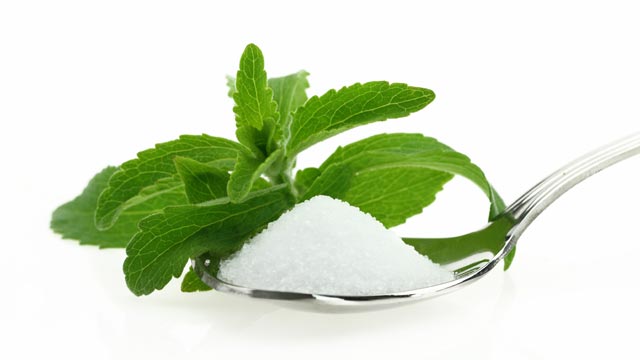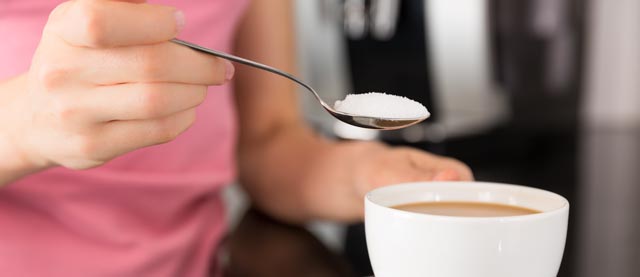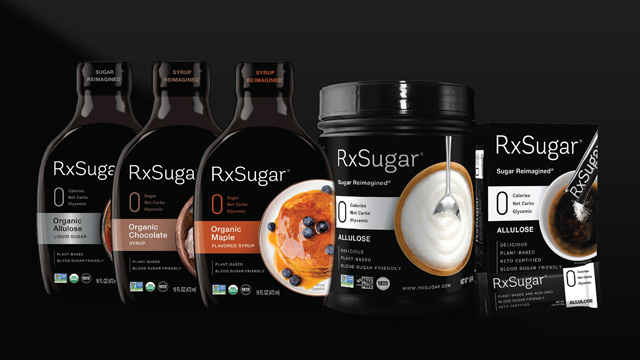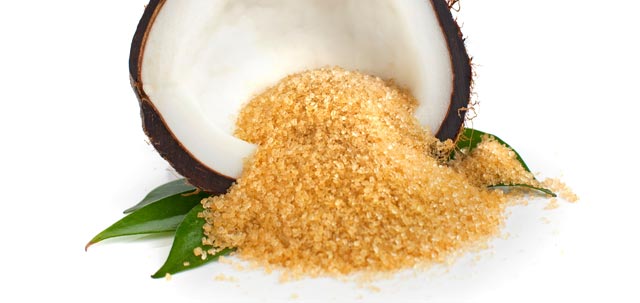Follow us 261.1k
When you follow a ketogenic diet, you need to swap your high-carb sweeteners for natural low-carb options. This post will guide you through the best sweeteners to use while following a healthy low-carb, high-fat diet.
Top 6 Low-Carb Sweeteners
1. Stevia
Stevia is an herb also known as “sugar leaf” or “stevia leaf”. The extract from the stevia plant is used as a sweetener and sugar substitute. It’s a zero calorie sweetener that doesn't affect blood sugar. Pure liquid stevia and stevia powder are 200 to 300 times sweeter than sugar, so make sure to use very small amounts to avoid a bitter aftertaste. The rule of thumb is to use no more than 3 to 5 drops per serving.
Apart from pure stevia powder and stevia drops, there are other types of products, including stevia glycerite (2-4 times as sweet as sugar with gooey texture), and granulated stevia-erythritol blends which are typically as sweet as sugar.

In a Nutshell, Stevia:
- has zero carbs and calories
- is 200 to 300 times sweeter than sugar
- recommended serving size: 3 to 5 drops of liquid stevia or a small pinch of stevia powder
- may taste bitter if amount exceeded
- recommended products: SweetLeaf, NuNaturals
Keto Recipes Using Stevia:
2. Erythritol [Updated, March 2023]
Update: According to this study, there might be some safety concerns when it comes to Erythritol. Please, read this thread for more information.
Erythritol is a sugar alcohol naturally found in fruits, vegetables, and fermented foods. It’s another keto-friendly sweetener as it does not affect blood glucose and has zero calories. 90% of erythritol is absorbed before it enters the large intestine and is excreted through urine. Compared to Xylitol—another type of sugar alcohol—it seems to be well tolerated and is less likely to cause stomach discomfort.
Apart from pure Erythritol, sweetener blends made with Erythritol are available. Swerve is a brand sweetener that is made with a blend of erythritol and prebiotic fibers called fructooligosaccharides (FOS). While Swerve is as sweet as sugar and can be used in 1:1 ratio, erythritol has about 70 percent of the sweetness of table sugar. If you don't like the cooling effect of erythritol, try Swerve. Apart from tasting more like sugar, it caramelises just like sugar and is suitable for treats such as Keto Crème Brûlée

In a Nutshell, Erythritol:
- has zero carbs and calories
- is 70% as sweet as sugar
- recommended serving size: to taste
- has a slight cooling effect which some people may not like
- recommended products: Now Foods, Sukrin (also offers brown sugar substitute)
Keto Recipes Using Erythritol:
Note: Some of my low-carb recipes use both stevia and erythritol. Using a combination of sweeteners rather than just one sweetener improves the taste as some sweeteners can be overpowering, e.g. too much stevia will result in a bitter aftertaste, while too much erythritol will enhance the cooling effect.
3. Monk Fruit (aka Luo Han Guo)
Monk fruit, also known as "luo han guo" or "longevity fruit", is a fruit native to China and northern Thailand. Similar to stevia, monk fruit extract is 200 to 300 times sweeter than sugar. It has been used in traditional Chinese medicine to treat obesity and diabetes.
It’s as sweet as stevia, has no calories and does not affect blood sugar. It’s available in both liquid and powdered form. Just like stevia, it’s found in some brand sweeteners where it’s combined with erythritol.

In a Nutshell, Monk Fruit:
- has zero carbs and calories
- is 200 to 300 times sweeter than sugar
- recommended serving size: 3 to 5 drops of liquid monk fruit or a small pinch of monk fruit powder
- may taste bitter if amount exceeded
- recommended products: Lakanto, NuNaturals
Monk Fruit can be substituted for stevia in equal amounts in any of my sweet keto recipes.
4. Xylitol
Similar to Erythritol, Xylitol is a sugar alcohol that naturally occurs in the fibres of certain fruits and vegetables. It tastes like sugar but has a low glycemic index and contains fewer calories. Although it's a healthy low-carb option for humans, beware that xylitol is toxic for dogs and cats!

In a Nutshell, Xylitol:
- is very low in carbs and calories
- is as sweet as sugar
- recommended serving size: no more than 2 Tbsp
- may cause GI distress if amount exceeded
- is toxic to dogs
- recommended products: Morning Pep, Now Foods
Keto Recipes Using Xylitol:
Unlike Erythritol, Xylitol has the ability to crystallize and is the ideal sweetener for hard candies and suckers. Although some low-carbers use xylitol, it is known to cause stomach discomfort and I personally avoid it because I can’t tolerate it very well.
5. Yacon Syrup
Yacon syrup is extracted from the yacon plant grown in South America. The root has been used for its nutritional and medical purposes for hundreds of years.
It’s made via natural evaporation, and it has a slightly caramel flavor that is similar to blackstrap molasses. It derives its sweetness from fructooligosaccharides (FOS), a type of sugar with a very low glycemic index. Although it’s low in carbs, it’s not a zero-carb sweetener and you should be using small amounts, such as 1-2 tablespoons per recipe, or no more than 1 teaspoon per serving.

In a Nutshell, Yacon Syrup:
- is low in carbs and calories
- recommended serving size: no more than 1 tsp
- very low glycemic index, low-moderate carb count
- 50 to 75% as sweet as honey
- recommended products: see available options on Amazon
Keto Recipes Using Yacon Syrup:
6. Allulose
Allulose is a relatively new low-carb sweetener that is said to have the same sweet taste as sugar but with minimal calories and carbohydrates. It provides 0.2 kcal/g compared to 4 kcal/g of table sugar. Although over 70% of the allulose you consume is absorbed in your blood, it is eliminated in the urine before it can be metabolized for fuel.
It has also been shown to cause minimal fermentation in the gut, meaning it will have a low likelihood of causing bloating or excess gas like other low-carb sweeteners.
There are several other benefits of using Allulose. It has no noticeable aftertaste and it does not crystallize once chilled. Unlike other low-carb sweeteners, it has the ability to caramelize just like sugar.
You can read all about Allulose in this guide.

There are a few options available on Amazon. The brand I use and like is RxSugar. If you live in the US you can get RxSugar 20% off by using this link or by using the code KETODIET20 at checkout.
In a Nutshell, Allulose:
- is low in carbs and calories
- is as sweet as sugar
- recommended serving size: to taste
- has no aftertaste
- caramelizes just like sugar and does not crystallize (best for smooth caramel, soft ice cream, fluffy marshmallows and chewy cookies)
- recommended products: The brand I use and like is RxSugar. If you live in the US you can get RxSugar 20% off by using this link or by using the code KETODIET20 at checkout.
Keto Recipes Using Allulose:
Other Low-Carb Sweeteners
(Updated June 2020) In the last few years even more new sweeteners become available. In my opinion the best one is allulose which tastes, browns and behaves just like sugar. It's perfect for ice creams, caramel sauce and chilled desserts.
Other options include tagatose and a sweetener called BochaSweet which is made from kabocha squash. All of these sweeteners are healthy alternatives to sugar.
Sweeteners To Avoid So You Don’t Exceed Your Carb Intake
Apart from table sugar and high-fructose corn syrup (HFCS), stay away from foods and sweeteners containing dextrose and maltodextrin. They are absorbed directly through the gut and raise blood sugar and insulin levels. Beware that some stevia and monk fruit sweetener blends use dextrose and maltodextrin to bulk up but do not count them as effective carbs!
Spotting sugar in foods is not as easy as you may think. With all the bad press sugar-laden products have received over the past few years, food manufacturers do anything to disguise sugar by using unfamiliar names such as galactose, lactose, fructose, maltose, carob syrup, fruit juice, sucrose or evaporated cane juice. You have to be extra careful - always check the nutrition facts! You can find all 60 sugar names at Sugar By Half.
How About "Healthy" High-Carb Sweeteners?
Sugar is sugar. It will always impair your weight loss and kick you out of ketosis. We live in the era of sugar overconsumption where soft drinks and sugary foods have become part of the standard diet.
There have never been so many people with metabolic issues including insulin resistance, obesity and hypertension, eventually leading to more serious conditions such as heart disease and type 2 diabetes.
Even seemingly healthy sweeteners such as honey, maple syrup, blackstrap molasses, rice malt syrup and coconut palm sugar should be approached with caution.
Perhaps one of the worst sweeteners is agave syrup which has been marketed as a "health food" for decades. Agave is 90% fructose that has damaging effects on our metabolism. Excessive consumption of fructose promotes insulin resistance, accumulation of visceral fat (buildup of fat around organs) and non-alcoholic fatty liver (NAFLD). Having NAFLD increases the risk of developing type 2 diabetes and heart disease.

Some Sugar Alcohols and IMOs
Certain sugar alcohols, including maltitol and sorbitol, should also be avoided as they will spike your blood sugar and disrupt ketosis. Most people should also avoid sweeteners with isomaltooligosaccharides (IMOs) as they will likely cause blood sugar spikes.
Many "low-carb" and "zero-carb" products are made with sugar-spiking maltitol, sorbitol or IMOs which are fully deducted from their total carb count, leading to mislabeled effective carb count (net carbs). In fact, the use of these sweeteners in commercial products is the main reason why the approach of counting "net" carbs is being misunderstood.
You may eat a chocolate bar with just 3 grams of net carbs and yet experience a blood sugar spike. This is simply down to the fact that sugar-spiking sweeteners used in the chocolate bar are not counted correctly.
Artificial Sweeteners - Eat or Avoid?
Although artificial sweeteners are zero-carb, they are not the best option for a healthy low-carb diet. While some sweeteners such as Sucralose, seem to be well tolerated, other artificial sweeteners including Aspartame, Acesulfame K and Cyclamate have been linked to adverse health effects. Although they are generally recognized as safe by the Food and Drug Administration (FDA) — with the exception of cyclamate, which remains banned in the US — studies have shown that some artificial sweeteners can trigger migraines and cravings as well as causing gut health issues.
Although research on artificial sweeteners remains controversial, let's not forget there are interest groups and research on aspartame seems to be greatly affected by the sources of funding. Notice that all industry funded studies found no adverse reactions to aspartame, while almost all non-industry funded studies found adverse reactions to aspartame.
Since there are so many better options, I personally avoid all artificial sweeteners.
Are Low-Carb Sweeteners Suitable for Weight Loss?
If your goal is to lose weight, you should limit or avoid all sweeteners as they may still trigger cravings. It doesn't mean you can never use any sweeteners but you should consider reducing or even avoiding them completely especially if you reach a weight loss plateau.
That’s why both of our premium keto meal plans use limited amounts of sweeteners to avoid cravings, while providing sufficient level of electrolytes to eliminate the symptoms of keto-flu.
If you want to avoid sweeteners altogether but still want to enjoy an occasional treat, below is a list of sweetener-free keto treats.
Sweetener-Free Keto Treats:

How To Substitute Sugar With Low-Carb Sweeteners
The amount of sweetener you’ll use depends on your palate. As you get used to low-carb eating, you will use smaller amounts of sweeteners or you may even avoid them altogether.
Sweetener Conversion Chart
1 tsp sugar
- = 2 to 3 drops liquid stevia or monk fruit
- = a pinch of pure powdered stevia or monk fruit
- = 1 tsp Erythritol or Swerve or Allulose
1 Tbsp sugar
- = 6 to 9 drops of liquid stevia or monk fruit
- = 1/4 tsp of pure powdered stevia or monk fruit
- = 1 Tbsp Erythritol or Swerve or Allulose
1 cup table (granulated) sugar
- = 1 cup granulated Swerve or Allulose
- = 1 1/3 cups granulated Erythritol
- = 1 cup granulated stevia or monk fruit blend
- = 1 tsp pure powdered stevia or monk fruit
- = 1 tsp liquid stevia or liquid monk fruit
1 cup confectioners' sugar
- = 1 cup confectioners' Swerve or Allulose
- = 1 1/3 cups confectioners' Erythritol
1 Tbsp honey, blackstrap molasses or maple syrup
- = 2 Tbsp yacon syrup or Allulose syrup
Infographic
Here's our easy to follow guide to healthy low-carb sweeteners with sweetener conversion chart. Feel free to pin, share and print it!
 Follow us 148.4k
Follow us 148.4k
Do you like this post? Share it with your friends!